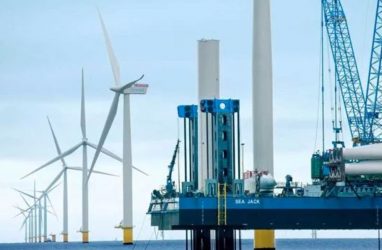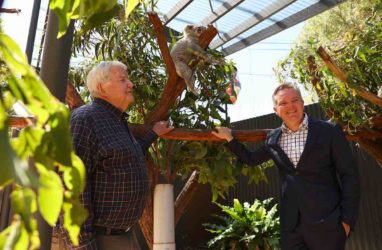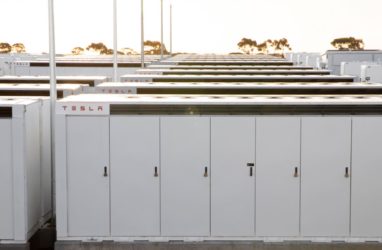Feed aggregator
Chubb review of Australia's carbon credit scheme falls short – and problems will continue to fester
“Solar Stopper:” ESB grid access reform slammed, again, as roadblock to renewables
![]() Smart Energy Council says Locational Marginal Pricing will stifle new large-scale solar development and all work on it should cease immediately.
Smart Energy Council says Locational Marginal Pricing will stifle new large-scale solar development and all work on it should cease immediately.
The post “Solar Stopper:” ESB grid access reform slammed, again, as roadblock to renewables appeared first on RenewEconomy.
Wind turbines are already skyscraper-sized – is there any limit to how big they will get?
 Why are wind turbines increasing in size at such a rapid rate – and is there a limit to how big they can go?
Why are wind turbines increasing in size at such a rapid rate – and is there a limit to how big they can go?
The post Wind turbines are already skyscraper-sized – is there any limit to how big they will get? appeared first on RenewEconomy.
Chubb prunes carbon credit scheme, but concern lingers over fossil fuel offsets
 Chubb Review recommends suite of “updates” to strengthen the integrity of Australia's carbon offset scheme, including dumping the "avoided forestation" methodology.
Chubb Review recommends suite of “updates” to strengthen the integrity of Australia's carbon offset scheme, including dumping the "avoided forestation" methodology.
The post Chubb prunes carbon credit scheme, but concern lingers over fossil fuel offsets appeared first on RenewEconomy.
Neoen hits go on two more big batteries, locks in three new PPAs
 French renewables developer hits the ground running in 2023, launching construction of two new big battery projects and inking new PPAs.
French renewables developer hits the ground running in 2023, launching construction of two new big battery projects and inking new PPAs.
The post Neoen hits go on two more big batteries, locks in three new PPAs appeared first on RenewEconomy.
Chubb review recommends new integrity body for Australian carbon credits scheme
Review dismissed claims the current system lacks integrity and is not delivering real cuts in emissions
- Follow our Australia news live blog for the latest updates
- Get our morning and afternoon news emails, free app or daily news podcast
A review of Australia’s controversial carbon credit system has recommended significant changes to how it is managed, but dismissed claims the scheme lacks integrity and is not delivering real cuts in greenhouse gas emissions.
The review panel, led by the former national chief scientist Prof Ian Chubb, found government agency the Clean Energy Regulator should be stripped of some of its roles running and overseeing the system to “enhance confidence and transparency”.
Continue reading...Chubb review finds ACCU market well-designed but calls for sweeping changes
Lützerath: German coal mine stand off amid Ukraine war energy crunch
Too many smelly candles? Here’s how scents impact the air quality in your home
While candles, diffusers and air fresheners are designed to give off fragrant smells, research shows they can emit chemicals that are far less pleasing
There’s nothing wrong with wanting your home to smell nice and fresh – and from candles to diffusers, there’s no shortage of home scent products to help you achieve that.
But having rampant fragrances in our indoor air can dramatically impact air quality, coming with a host of potential problems.
Sign up for our rundown of must-reads, pop culture and tips for the weekend, every Saturday morning
Continue reading...Households in Yorkshire ‘most willing to live near windfarm’
Midlands and north-east of England also show strong demand, says supplier Octopus Energy
Households in Yorkshire, the Midlands and the north-east of England are most willing to live near a windfarm in return for cheaper power, Octopus Energy has said.
The energy supplier has said the public are increasingly open to windfarms being built near them, as the government appears set to lift a seven-year ban on new onshore wind developments in England.
Continue reading...Meet the eastern bristlebird: tragically under-appreciated, and one fire away from local extinction
Can customary harvesting of NZ's native species be sustainable? Archaeology and palaeo-ecology provide some answers
Single-use cutlery and plates to be banned in England
Electric planes sound like a fantasy but they may be the future for short-haul in Australia
With net zero technologies for long-haul flights still far in the future, opportunities may lie with smaller operators flying shorter distances
In late September the first fixed-wing passenger electric passenger aircraft took off from Grant County international airport in the US state of Washington. The nine-seater charter plane – known as Alice – soared to 3,500 feet for eight minutes.
Less than two months later, Northern Territory Air Services, a scheduled airline and charter operator, put in an order to bring 20 of the aircraft to Australia with plans to fly passengers from Darwin to Uluru and Mount Isa.
Continue reading...‘A roaring fireplace’: the polluting raffle prize from the British Heart Foundation
Research charity’s bid to raise money through a scheme that goes against its own principles sparks wrath of clean air campaigners
The British Heart Foundation (BHF), which has campaigned on the pollution risks of burning wood at home, is being urged to review a charity draw for a £3m London townhouse, with a fire pit on the garden terrace and open fires in the property.
A promotional video shows wood being burned in the metal fire pit at the property in north London and an open fire next to a bath. “Take a soak in your sumptuous stone tub and relax to the crackling sounds of the roaring fireplace,” says the promotion.
Continue reading...Thor the disoriented walrus enthralled Brits, but cut no ice with climate sceptics | Robin McKie
Warming seas almost certainly prompted the huge mammal’s wanderings, even if deniers claim all is well in the Arctic
As migrant arrivals go, the appearance of Thor the Walrus in British waters last week was encouraging. Thousands flocked to greet the huge mammal as he meandered up England’s east coast after his arrival in Hampshire in December.
Subsequent stopovers included Scarborough, where the local council cancelled New Year’s Eve celebrations so they did not frighten Thor, who gratefully responded by masturbating. Then he moved on to Blyth, in Northumberland, before heading home to the Arctic.
Continue reading...‘A search for ourselves’: shipwreck becomes focus of slavery debate
Vessel that sank with more than 200 transported people onboard is being used to humanise the story of slavery
In 2015, a delegation from the Smithsonian Institution travelled to Mozambique to inform the Makua people of a singular and long-overdue discovery. Two hundred and twenty-one years after it sank in treacherous waters off Cape Town, claiming the lives of 212 enslaved people, the wreck of the Portuguese slave ship the São José Paquete D’Africa had been found. When told the news, a Makua leader responded with a gesture that no one on the delegation will ever forget.
“One of the chiefs took a vessel we had, filled it with soil and asked us to bring that vessel back to the site of the slave ship so that, for the first time since the 18th century, his people could sleep in their own land,” says Lonnie Bunch, now the secretary of the Smithsonian.
Continue reading...Vanishing bird: the mystery of the ‘near-mythical’ Australian painted-snipe
Sightings are so rare that no one has recorded the call of these elusive waders, but a mission has begun to finally learn where they go when they disappear
“Near-mythical” is how the ecologist Matthew Herring describes the Australian painted-snipe – one of this continent’s rarest birds.
“Some of these terms get thrown around,” Herring says, “but they really are.”
Continue reading...‘Holy grail’ wheat gene discovery could feed our overheated world
Harvests that form a vital element of the diets of 4.5 billion people are being devastated by global heating. Now research has found a key to create a heat-resistant variety
It is the plant that changed humanity. Thanks to the cultivation of wheat, homo sapiens was able to feed itself in ever-increasing numbers, transforming groups of hunter-gatherers struggling to survive in a hostile world into rulers of the planet.
In the process, a species of wild grass that was once confined to a small part of the Middle East now covers vast stretches of the Earth. As the historian Yuval Noah Harari has observed: “In the great plains of North America, where not a single wheat stalk grew 10,000 years ago, you can today walk for hundreds upon hundreds of kilometres without encountering any other plant.”
Continue reading...How can Britain ever embrace cycling if our bikes keep getting stolen? | Adam Becket
Police have never taken cycle theft seriously – and the worst effects of this crime are felt by young and disadvantaged people
- Adam Becket is a senior writer for Cycling Weekly
For most cyclists, bike theft feels like an inevitability. It’s just one of those risks that you are doomed to face any day you take your bike out. Such is the fear I have of my pride and joy being stolen – yes, I am one of those people who consider my bike to be my most important possession – that I rarely, if ever, lock it up outside. At home, it stays inside. At work, I take it into the building. If the bike is outside, I’m either on it or in close proximity to it.
It doesn’t seem to matter what kind of lock or preventive measure you use, or where you leave them, bikes – from a cheap, secondhand cycle to a top-of-the-range racer – can just go missing in an instant, with little recourse apart from claiming on insurance.
Adam Becket is a senior writer for Cycling Weekly
Continue reading...


